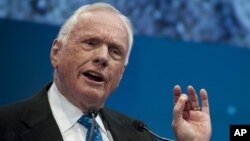Former U.S. astronaut Neil Armstrong, the first man to walk on the moon, has died.
A family statement said the 82-year-old icon died Saturday in his home state of Ohio, following a cardiovascular procedure earlier this month.
Armstrong commanded the Apollo 11 spacecraft that landed on the moon on July 20, 1969. After stepping on the lunar surface, he sent the historic message: "that's one small step for man, one giant leap for mankind." As an enthralled world looked on, Armstrong spent nearly three hours walking on the moon with fellow astronaut Edwin "Buzz" Aldrin.
Armstrong had largely withdrawn from public life in recent years. But he spoke earlier this year at Ohio State University at an event honoring fellow space pioneer John Glenn, former senator from Ohio.
Weeks after the moon walk, Armstrong, Aldrin and the mission's third astronaut, Michael Collins, received a thunderous welcome with ticker-tape parades in New York, Chicago and Los Angeles. They later made a world tour.
The moon walk marked America's victory in the Cold War space race with the Soviet Union that began in October 1957 with the launch of the Soviet satellite "Sputnik 1."
President Barack Obama, in a statement Saturday, called Armstrong "among the greatest of American heroes, not just of his time, but of all time. When he and his fellow crew members lifted off ... they carried with them the aspirations of an entire nation. They set out to show the American spirit can see beyond what seems unimaginable - that with enough drive and ingenuity, anything is possible."
Presumptive Republican presidential nominee Mitt Romney called Armstrong an American hero who will inspire him for the rest of his life. He praised the astronaut for operating "with courage unmeasured and unbounded love for his country."
Saturday's family statement described Armstrong as "a loving husband, grandfather brother and friend." It asked that the public "honor his example of service, accomplishment and modesty. And the next time you walk outside on a clear night and see the moon smiling down at you, think of Neil Armstrong and give him a wink."
Armstrong's Apollo 11 mission earned decorations from 17 nations and many special American honors, including the Presidential Medal of Freedom, the Congressional Space Medal of Honor and the NASA Distinguished Service Medal.
In later years, he served as Deputy Associate Administrator at NASA headquarters, and was a professor of aerospace engineering at the University of Cincinnati. He and his family lived on a 120-hectare farm outside of Cincinnati, Ohio.
A family statement said the 82-year-old icon died Saturday in his home state of Ohio, following a cardiovascular procedure earlier this month.
Armstrong commanded the Apollo 11 spacecraft that landed on the moon on July 20, 1969. After stepping on the lunar surface, he sent the historic message: "that's one small step for man, one giant leap for mankind." As an enthralled world looked on, Armstrong spent nearly three hours walking on the moon with fellow astronaut Edwin "Buzz" Aldrin.
Armstrong had largely withdrawn from public life in recent years. But he spoke earlier this year at Ohio State University at an event honoring fellow space pioneer John Glenn, former senator from Ohio.
Weeks after the moon walk, Armstrong, Aldrin and the mission's third astronaut, Michael Collins, received a thunderous welcome with ticker-tape parades in New York, Chicago and Los Angeles. They later made a world tour.
The moon walk marked America's victory in the Cold War space race with the Soviet Union that began in October 1957 with the launch of the Soviet satellite "Sputnik 1."
President Barack Obama, in a statement Saturday, called Armstrong "among the greatest of American heroes, not just of his time, but of all time. When he and his fellow crew members lifted off ... they carried with them the aspirations of an entire nation. They set out to show the American spirit can see beyond what seems unimaginable - that with enough drive and ingenuity, anything is possible."
Presumptive Republican presidential nominee Mitt Romney called Armstrong an American hero who will inspire him for the rest of his life. He praised the astronaut for operating "with courage unmeasured and unbounded love for his country."
Saturday's family statement described Armstrong as "a loving husband, grandfather brother and friend." It asked that the public "honor his example of service, accomplishment and modesty. And the next time you walk outside on a clear night and see the moon smiling down at you, think of Neil Armstrong and give him a wink."
Armstrong's Apollo 11 mission earned decorations from 17 nations and many special American honors, including the Presidential Medal of Freedom, the Congressional Space Medal of Honor and the NASA Distinguished Service Medal.
In later years, he served as Deputy Associate Administrator at NASA headquarters, and was a professor of aerospace engineering at the University of Cincinnati. He and his family lived on a 120-hectare farm outside of Cincinnati, Ohio.






